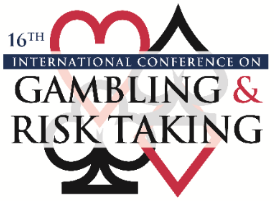How Poker Players Perceive the Evolution in Their Gambling Behaviours: the Consistence of Perceptions
Session Title
Session 3-4-D: Player Perceptions and Messages
Presentation Type
Event
Location
The Mirage Hotel & Casino, Las Vegas, Nevada
Start Date
9-6-2016 4:00 PM
End Date
9-6-2016 5:30 PM
Disciplines
Cognition and Perception | Psychology
Abstract
Poker playing is of serious concern to public health officials because of the risk gamblers run of developing gamblingproblems. To date, few longitudinal studies have examined the variation in gambling behaviors among poker players (PPs). Furthermore, there is little knowledge concerning the PPs’ perception of their changing gambling behavior.
This qualitative study thus aims to: 1) describe and understand PPs’ perception of how their gambling behavior is evolving; 2) understand how PPs explain the change in their gambling behavior; 3) compare the players’ perception to a quantitative measure from the Problem Gambling Severity Index (PGSI).
A convenience sample of 25 poker players was recruited from an ongoing prospective study to participate in this qualitative interview. Thirteen participants were selected because of an increase in their PGSI score and twelve participants due to a decrease.
The majority (19/25) of the PPs perceived a decrease in their poker activities, three perceived an increase, and the other three perceived no change. Players who perceived an increase gave gambling pleasure and financial objectives as an explanation. The PPs who perceived a decrease spoke of less pleasure, time, and opportunities. In this latter group, the perception of half of the players (9/19) agreed with their lower PGSI score; for the other half however (10/19), their perception was contrary to the actual increase in their PGSI score. This study accordingly highlights the difficulty for the gamblers to be aware of their changing gambling behaviors.
Keywords
poker, changing behavior, perception, qualitative study
Streaming Media
How Poker Players Perceive the Evolution in Their Gambling Behaviours: the Consistence of Perceptions
The Mirage Hotel & Casino, Las Vegas, Nevada
Poker playing is of serious concern to public health officials because of the risk gamblers run of developing gamblingproblems. To date, few longitudinal studies have examined the variation in gambling behaviors among poker players (PPs). Furthermore, there is little knowledge concerning the PPs’ perception of their changing gambling behavior.
This qualitative study thus aims to: 1) describe and understand PPs’ perception of how their gambling behavior is evolving; 2) understand how PPs explain the change in their gambling behavior; 3) compare the players’ perception to a quantitative measure from the Problem Gambling Severity Index (PGSI).
A convenience sample of 25 poker players was recruited from an ongoing prospective study to participate in this qualitative interview. Thirteen participants were selected because of an increase in their PGSI score and twelve participants due to a decrease.
The majority (19/25) of the PPs perceived a decrease in their poker activities, three perceived an increase, and the other three perceived no change. Players who perceived an increase gave gambling pleasure and financial objectives as an explanation. The PPs who perceived a decrease spoke of less pleasure, time, and opportunities. In this latter group, the perception of half of the players (9/19) agreed with their lower PGSI score; for the other half however (10/19), their perception was contrary to the actual increase in their PGSI score. This study accordingly highlights the difficulty for the gamblers to be aware of their changing gambling behaviors.

Comments
Audio recording of this presentation is attached as a downloadable MP3 audio file, 62.4 MB
This presentation begins at 32:50